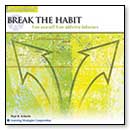Overcome Your Sweet Tooth
Long before those decked out goblins and ghouls and superheroes arrive on doorsteps this Hollow’s Eve many adults will have dipped into their stock of candy.
Though intended for trick-or-treaters, the majority of adults admit to purchasing their personal favorites during the biggest candy-selling holiday of the year, expected to exceed $2.7 billion.
Despite ever growing awareness about the pernicious effects of sugar, ranging from diabetes to obesity, the average American consumes about 22 teaspoons of added sugar each day, according to the Harvard School of Public Health. Beyond candy, refined sugars can be found in everything from sodas and peanut butter to barbecue sauce and bread.
Could we be addicted to sugar?
It’s possible, according to Princeton University researchers who have studied the signs of sugar addiction in rats. They’ve shown that rats bingeing on sugar demonstrated the three elements of addiction: a behavioral pattern of increased intake and changes in brain chemistry; signs of withdrawal and further changes in brain chemistry upon deprivation; and, signs of cravings and relapse after withdrawal is over.
Lead Researcher Bart Hoebel said sugar triggers the production of the brain’s natural opioids, and the rats become addicted just as they would to cocaine, alcohol, and nicotine.
Do you have a sugar dependency you want to eliminate? Do you find yourself engaged in unhealthy patterns such eating while watching television?
You can break addictions and habits using the incredible power of your mind.
Pay attention to the messages you are sending yourself. When you make a statement, your brain searches its vast network and the world around to validate what you say and determine whether the statement is true or not.
For instance, the statements “I have no willpower” or “I can’t stop eating sweets” automatically cause your brain to search for and find validation based on your limiting beliefs.
The key is to ask questions and make statements that invite the tremendous power of your brain to seek positive outcomes and solutions.

Next time you’re about to cave in to an unhealthy craving or habit, ask yourself questions based on those from our
Break the Habit Paraliminal. For example:
- How would I feel if I didn’t eat this sugary snack?
- What have I learned from my sugar dependency?
- In what ways have I already demonstrated possession of my desired healthy eating habits?
Place your questions in highly visible locations, such as near the refrigerator or next to the remote control. Consistent reminders will result in a noticeable shift in focus—from negative to positive. Remember, you are only limited by the messages you send yourself.
To increase your personal power and instill new positive choices in your life, I recommend you listen to the
Break the Habit Paraliminal. Simply push play, close your eyes, relax, and listen. This closed-eye process activates your "whole mind" with a precise blend of music and words to help you get the most out of every minute.
To learn more about
Break the Habit and all our other Paraliminal programs,
please click here.